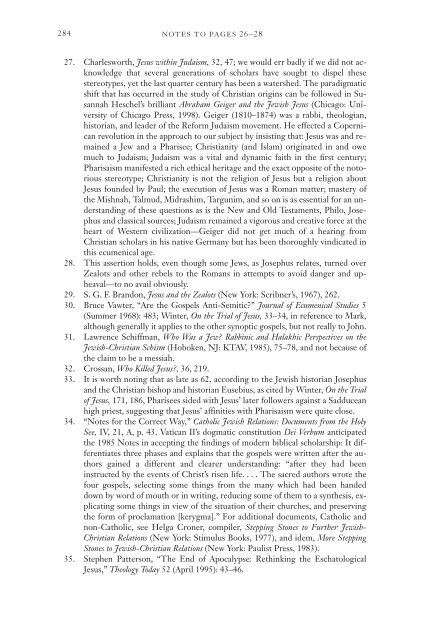41845358-Antisemitism
41845358-Antisemitism
41845358-Antisemitism
Create successful ePaper yourself
Turn your PDF publications into a flip-book with our unique Google optimized e-Paper software.
284 NOTES TO PAGES 26–28<br />
27. Charlesworth, Jesus within Judaism, 32, 47; we would err badly if we did not acknowledge<br />
that several generations of scholars have sought to dispel these<br />
stereotypes, yet the last quarter century has been a watershed. The paradigmatic<br />
shift that has occurred in the study of Christian origins can be followed in Susannah<br />
Heschel’s brilliant Abraham Geiger and the Jewish Jesus (Chicago: University<br />
of Chicago Press, 1998). Geiger (1810–1874) was a rabbi, theologian,<br />
historian, and leader of the Reform Judaism movement. He effected a Copernican<br />
revolution in the approach to our subject by insisting that: Jesus was and remained<br />
a Jew and a Pharisee; Christianity (and Islam) originated in and owe<br />
much to Judaism; Judaism was a vital and dynamic faith in the first century;<br />
Pharisaism manifested a rich ethical heritage and the exact opposite of the notorious<br />
stereotype; Christianity is not the religion of Jesus but a religion about<br />
Jesus founded by Paul; the execution of Jesus was a Roman matter; mastery of<br />
the Mishnah, Talmud, Midrashim, Targunim, and so on is as essential for an understanding<br />
of these questions as is the New and Old Testaments, Philo, Josephus<br />
and classical sources; Judaism remained a vigorous and creative force at the<br />
heart of Western civilization—Geiger did not get much of a hearing from<br />
Christian scholars in his native Germany but has been thoroughly vindicated in<br />
this ecumenical age.<br />
28. This assertion holds, even though some Jews, as Josephus relates, turned over<br />
Zealots and other rebels to the Romans in attempts to avoid danger and upheaval—to<br />
no avail obviously.<br />
29. S. G. F. Brandon, Jesus and the Zealots (New York: Scribner’s, 1967), 262.<br />
30. Bruce Vawter, “Are the Gospels Anti-Semitic?” Journal of Ecumenical Studies 5<br />
(Summer 1968): 483; Winter, On the Trial of Jesus, 33–34, in reference to Mark,<br />
although generally it applies to the other synoptic gospels, but not really to John.<br />
31. Lawrence Schiffman, Who Was a Jew? Rabbinic and Halakhic Perspectives on the<br />
Jewish-Christian Schism (Hoboken, NJ: KTAV, 1985), 75–78, and not because of<br />
the claim to be a messiah.<br />
32. Crossan, Who Killed Jesus?, 36, 219.<br />
33. It is worth noting that as late as 62, according to the Jewish historian Josephus<br />
and the Christian bishop and historian Eusebius, as cited by Winter, On the Trial<br />
of Jesus, 171, 186, Pharisees sided with Jesus’ later followers against a Sadducean<br />
high priest, suggesting that Jesus’ affinities with Pharisaism were quite close.<br />
34. “Notes for the Correct Way,” Catholic Jewish Relations: Documents from the Holy<br />
See, IV, 21, A, p. 43. Vatican II’s dogmatic constitution Dei Verbum anticipated<br />
the 1985 Notes in accepting the findings of modern biblical scholarship: It differentiates<br />
three phases and explains that the gospels were written after the authors<br />
gained a different and clearer understanding: “after they had been<br />
instructed by the events of Christ’s risen life. ... The sacred authors wrote the<br />
four gospels, selecting some things from the many which had been handed<br />
down by word of mouth or in writing, reducing some of them to a synthesis, explicating<br />
some things in view of the situation of their churches, and preserving<br />
the form of proclamation [kerygma].” For additional documents, Catholic and<br />
non-Catholic, see Helga Croner, compiler, Stepping Stones to Further Jewish-<br />
Christian Relations (New York: Stimulus Books, 1977), and idem, More Stepping<br />
Stones to Jewish-Christian Relations (New York: Paulist Press, 1983).<br />
35. Stephen Patterson, “The End of Apocalypse: Rethinking the Eschatological<br />
Jesus,” Theology Today 52 (April 1995): 43–46.


